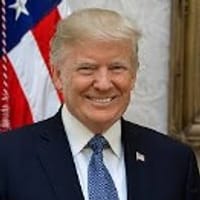
Donald Trump's tariff announcement caused market turbulence, with stocks and Bitcoin declining, while gold surged.
Michael Saylor argues Bitcoin's correlation with the stock market is temporary, driven by its high liquidity during panic selling.
Despite short-term volatility, Bitcoin significantly outperformed traditional assets like stocks and gold in 2024.
Since February, when Donald Trump

 Donald Trump
Donald J. Trump is a US-based entrepreneur, Pro-crypto Politician, and the 45th and 47th President of the United States of America. He understands the importance and needs of the modern fintech world, and people look up to him as a dominant pro-crypto leader.
Quick Facts
Full name Donald John Trump Birth 14-06-1946, New York, United States Nationality American Education BS from the University of Pennsylvania Known For Businessman, Pro-Crypto Politician
Once doubtful about Bitcoindominance, he said in a tweet in 2019, “I am not a fan of Bitcoin", but now has a significant amount of cryptocurrency holdings in his kitty. He has also signed an Executive Order to establish a Strategic Bitcoin Reserve, which highlights his commitment to the future of cryptocurrency.
Donald Trump - Career Highlights & Events
2016 – Elected as the 45th President of the United States from the Republican Party. 2017 – Signed the Tax Cuts and Jobs Act, impacting investment environments 2019 – Criticized Bitcoin and Libra on X, dubbing them as "not money" 2024 – Campaign signals potential openness to crypto-friendly reforms 2025 – Elected as the 47th President of the United States from the Republican Party.
A meme coin, $TRUMP, is associated with Donald Trump, which is listed on the Solana blockchain platform. His family also backs World Liberty Financial (WLF), a crypto venture.
President announced his aggressive tariff plan, the U.S. economy has been on shaky ground. Stocks have tumbled, with the S&P 500 down 9.5% and the Nasdaq 100 dropping over 12%. But the real shock? Bitcoin—often seen as a hedge against financial uncertainty—has followed the same downward path, losing nearly 18.5%. Meanwhile, gold, the traditional safe haven, has surged by 10.47%.
Donald Trump
Donald J. Trump is a US-based entrepreneur, Pro-crypto Politician, and the 45th and 47th President of the United States of America. He understands the importance and needs of the modern fintech world, and people look up to him as a dominant pro-crypto leader.
Quick Facts
Full name Donald John Trump Birth 14-06-1946, New York, United States Nationality American Education BS from the University of Pennsylvania Known For Businessman, Pro-Crypto Politician
Once doubtful about Bitcoindominance, he said in a tweet in 2019, “I am not a fan of Bitcoin", but now has a significant amount of cryptocurrency holdings in his kitty. He has also signed an Executive Order to establish a Strategic Bitcoin Reserve, which highlights his commitment to the future of cryptocurrency.
Donald Trump - Career Highlights & Events
2016 – Elected as the 45th President of the United States from the Republican Party. 2017 – Signed the Tax Cuts and Jobs Act, impacting investment environments 2019 – Criticized Bitcoin and Libra on X, dubbing them as "not money" 2024 – Campaign signals potential openness to crypto-friendly reforms 2025 – Elected as the 47th President of the United States from the Republican Party.
A meme coin, $TRUMP, is associated with Donald Trump, which is listed on the Solana blockchain platform. His family also backs World Liberty Financial (WLF), a crypto venture.
President announced his aggressive tariff plan, the U.S. economy has been on shaky ground. Stocks have tumbled, with the S&P 500 down 9.5% and the Nasdaq 100 dropping over 12%. But the real shock? Bitcoin—often seen as a hedge against financial uncertainty—has followed the same downward path, losing nearly 18.5%. Meanwhile, gold, the traditional safe haven, has surged by 10.47%.
This unusual market movement has sparked a big question: Is Bitcoin truly an independent asset, or is it more connected to traditional markets than we thought? Michael Saylor

 Michael Saylor
Michael Saylor is a US-based entrepreneur and Bitcoin Advocate. He is the founding member of MicroStrategy (now Strategy), a development company that focuses on cloud-based services. He urges investors to invest in Bitcoin and shares new updates on Bitcoin on his X account.
His firm, Strategy, now makes Bitcoin its primary reserve and stockpiles Bitcoin frequently. He has attended several events like the Bitcoin Conference 2025 to advocate for Bitcoin and its future growth.
Quick Facts
Full Name Michael J. Saylor Birth 04-02-1965 in Lincoln, Nebraska Nationality American Education BS from MIT Known for Bitcoin Advocacy
Michael Saylor – Career Timeline 1996: Named "Washington High-Tech Entrepreneur of the Year" 1998: MicroStrategy went public through an IPO 2021: Became a top Bitcoin advocate and urged its adoption. msaylor@microstrategy.com EntrepreneurCrypto and Blockchain ExpertAuthor , a longtime Bitcoin advocate, has a strong opinion on this – and his reasoning might just change how you see the crypto market.
Michael Saylor
Michael Saylor is a US-based entrepreneur and Bitcoin Advocate. He is the founding member of MicroStrategy (now Strategy), a development company that focuses on cloud-based services. He urges investors to invest in Bitcoin and shares new updates on Bitcoin on his X account.
His firm, Strategy, now makes Bitcoin its primary reserve and stockpiles Bitcoin frequently. He has attended several events like the Bitcoin Conference 2025 to advocate for Bitcoin and its future growth.
Quick Facts
Full Name Michael J. Saylor Birth 04-02-1965 in Lincoln, Nebraska Nationality American Education BS from MIT Known for Bitcoin Advocacy
Michael Saylor – Career Timeline 1996: Named "Washington High-Tech Entrepreneur of the Year" 1998: MicroStrategy went public through an IPO 2021: Became a top Bitcoin advocate and urged its adoption. msaylor@microstrategy.com EntrepreneurCrypto and Blockchain ExpertAuthor , a longtime Bitcoin advocate, has a strong opinion on this – and his reasoning might just change how you see the crypto market.
Let’s break it down.
Is Bitcoin Really Independent?
Bitcoin saw major gains after political shifts in the U.S. On November 5, 2024, it was trading at $67,772.62. Over the next two weeks, from November 5 to 22, it surged by over 45.8%. By December 17, it hit a yearly high of $108,389.70.
In early 2025, Bitcoin fluctuated between $89,310 and $106,395.41. Then, on January 20, it reached an all-time high of $109,000.
However, after Donald Trump took office and introduced his tariff policy, Bitcoin lost momentum. Since February, it has dropped more than 18.49%, following the decline of the U.S. stock market. This has raised concerns about its ability to act as a hedge against financial instability.
Michael Saylor: Bitcoin’s Stock Market Link Won’t Last
Michael Saylor dismisses claims that Bitcoin is losing its status as an independent asset. He argues that the recent connection between Bitcoin and stocks is only a short-term reaction.
He points out that Bitcoin’s high liquidity and 24/7 availability make it an easy asset to sell when markets crash. In times of panic, investors sell what they can, and Bitcoin is always available for trading.
However, he insists that this temporary trend does not mean Bitcoin will always follow stock market movements. Long term, he believes Bitcoin will remain a non-correlated asset, independent of traditional markets.
Bitcoin vs. Stocks and Gold: The Bigger Picture
Looking at the broader picture, Bitcoin’s long-term performance tells a different story. In 2024, Bitcoin’s value skyrocketed by 121.1%, far outpacing traditional assets. The S&P 500 gained only 24.05%, while the Nasdaq 100 rose by 27.1%. Even gold, often considered the safest investment, increased by just 27.54%.
As discussions continue about Bitcoin’s market behavior, one thing is certain: short-term volatility does not define its long-term potential. While it may currently move in sync with U.S. stocks, history suggests Bitcoin has the ability to break free and prove itself as a truly independent financial asset.
Never Miss a Beat in the Crypto World!
Stay ahead with breaking news, expert analysis, and real-time updates on the latest trends in Bitcoin, altcoins, DeFi, NFTs, and more.
FAQs
Bitcoin dropped 18.49% since the tariff announcement, reflecting market-wide risk aversion, but experts see this as a temporary trend.
If market uncertainty eases, Bitcoin could rebound, with analysts eyeing $2,400 as the next key resistance level.










